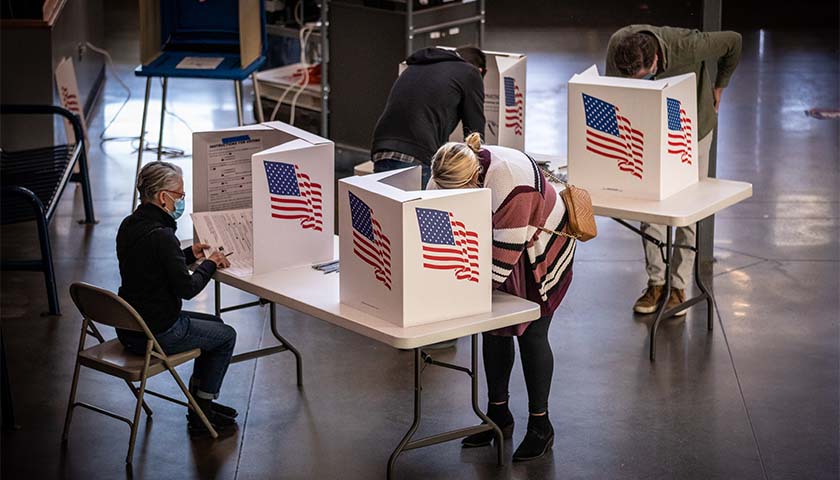A consortium of Left-leaning groups is seeking to get an initiative on the Arizona ballot that is very similar to the federal HR 1. “Arizonans for Free and Fair Elections” rolls back recent election integrity laws passed by the Arizona Legislature, makes it easier for people to vote without proving citizenship, and removes standard election fraud safeguards like requiring registering to vote in advance of elections.
The Arizona Free Enterprise Club (AFEC) called the initiative “a leftist wish list of election law changes.” AFEC contends, “[T]heir federal takeover of elections has been held up in the U.S. Senate for months, so they have moved to ‘Plan B ’— taking over the election process in Arizona.”
The lengthy 26-page initiative primarily makes these changes:
- Allows Election Day voter registration
- Allows incapacitated persons to vote, unless they have been specifically declared incapable of voting
- Allows voter registration with minimal identification, such as a pay stub
- Voters who have no proof of citizenship will receive a federal-only ballot
- Repeals Arizona’s ballot harvesting ban
- Allows third parties to register people to vote online
- Automatically registers to vote anyone who applies for a driver’s license or renewal
- Makes it more difficult for a court to allow a legislative subpoena in order to conduct an audit of an election, including awarding attorneys fees and making it a felony
- Greatly decreases the amount of money individuals, corporations, and PACs can contribute to candidates
- Significantly increases the amount of funding Clean Elections candidates can receive
- Gives state income tax return filers the option of contributing $5 to Clean Elections as a tax credit
- Makes it easier for initiatives, citizens’ referendums, and recalls to get on the ballot, by changing “strict” compliance with legal requirements to “substantial”
- Makes it harder to disqualify initiatives, citizens’ referendums, and recalls due to flaws by the circulator
- Allows political party changes on the day of the presidential preference election
- Makes it harder to cancel voter registrations of inactive voters; “active early voting list” is renamed to “permanent early voting list,” reversing a law passed in 2021
- Early ballots are accepted that are postmarked on Election Day
- Prohibits asking for ID when early ballots are submitted in person
- Prohibits generous cure provisions for ballots that are rejected
- Makes it harder to prosecute illegal voter registration or voting, by requiring evidence that the voter knew or intended to do it
- Allows anyone to register to vote online without a driver’s license number or non-operating identification license number
- Expands forms of ID allowed at the polls beyond even utility bills
- Eliminates the 30-day residency requirement in order to vote
- No longer need to be registered to vote within a precinct, can be registered anywhere in Arizona and vote at a “vote center”
- People applying for a change of address with the Department of Transportation will also have the ability to register to vote, and only provide minimal information, not photo ID
- People who apply for a change of address with the Department of Transportation who provide proof of U.S. citizenship will be automatically registered to vote
- Disqualifies electors who don’t choose the president selected by Arizona’s presidential election
- Requires minimal identification for voters to change their address for the presidential election, such as merely a written signature
- Election Day voter registration laws shall be “liberally construed”
The initiative also contains a completely unrelated provision that raises taxes on businesses. If it passes, it would become far more difficult for the Arizona Senate to order an audit of an election. It would stop efforts to ban ballot drop boxes.
Arizona Deserves Better, Arizona Democracy Collaborative, Arizona Democracy Resource Center, MI Familia Vota, Chispa Arizona, League of Conservation Voters, and Living United for Change in Arizona (LUCHA) are some of the groups behind the initiative. LUCHA successfully got two ballot initiatives passed previously increasing the minimum wage. The Fair Elections Center is an ally.
🚨 🚨 HUGE NEWS 🚨 🚨 For years, our freedom to vote has been under attack. Today, we're launching the Arizonans for Fair Elections ballot initiative to fight back and protect free and fair elections!
Join the fight: https://t.co/lRIC1IdJMa
— Arizona Democracy Resource Center (@ArizonaResource) February 8, 2022
Eric Cramer of Arizona Deserves Better told the left-wing site Blog for Arizona during an interview about the initiative, “The right-wing majority in the legislature is a dangerous beast. All of these legislators are competing to see who could really be the Alpha crazy of the group. … We can’t go back just because a minority wants to worship a dictator.”
Arizonans for Fair Elections made the news in 2020 due to a lawsuit the organization filed against Arizona Secretary of State Katie Hobbs, asking the state to permit online signature collection for ballot petitions due to COVID-19. Hobbs refused to defend the law, and so the Arizona Republican Party, AFEC, and the Goldwater Institute jumped in. Arizonans for Fair Elections ultimately lost.
This wasn’t the first time Hobbs refused to defend an election lawsuit. When she refused to defend the Democratic National Committee’s lawsuit challenging the state’s laws requiring voters to vote within their own precincts, Arizona Attorney General Mark Brnovich stepped in instead. He argued the case at the Supreme Court and won, in Brnovich v. DNC.
Filed on February 7, the initiative must collect 237,645 valid signatures within five months in order to get on the fall ballot. There are dozens of election integrity bills in the Arizona Legislature this year which mainly reject provisions in the initiative. Also, a couple of ballot initiatives striving to get on the ballot also conflict with its provisions, including the Easier to Vote, Harder to Cheat Act and AFEC’s Arizonans for Voter ID Act.
– – –
Rachel Alexander is a reporter at the Arizona Sun Times and The Star News Network. Follow Rachel on Twitter. Email tips to [email protected].
Photo “Election Day 2020” by Phil Roeder. CC BY 2.0.





